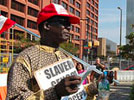
After an extended period, yesterday marked the final chance for Southern Sudanese living abroad to register to vote for the January 9th referendum. The much anticipated referendum will decide whether or not South Sudan will become an independent state or remain part of a unified Sudan. With nearly half a million southern Sudanese living in the United States, registration centers were opened across the country from Alexandria, VA to Chicago and Seattle. Over 50,000 out-of-country registrants have already been counted, and among them are NBA star Luol Deng and activist Simon Deng.
After registering in Alexandria earlier this month, Simon Deng spoke with Enough about the registration process, his recent walk around Capitol Hill to raise awareness about the upcoming vote, and his dreams of an independent Southern Sudan. (Editor’s Note: This Q&A was edited for brevity.)
You just returned from registering to vote. Can you describe the registration process? How did you feel after registering?
The process was simple and smooth. They asked for my identification even though I knew most of those working there personally. But these are the formalities. I asked what I.D. do you want—my I.D. from being a Sudanese swimming champion, my Sudanese passport, my American passport, or my driver’s license? They told me whatever is closest in my wallet. I feel that voting is a duty and a once in a lifetime moment. This is a chance that will never come again.
Even though the Sudanese community in the United States is relatively small compared to the population of southern Sudan, are diaspora members still passionate about the act of voting?
Every vote is important. Even one vote makes a difference. There are one-half million southern Sudanese in the United States and even if only 150,000 people vote that will make an impact, even if 100,000 people vote that will make an impact, even if only 50,000 people vote that will make an impact. Each and every vote will have an impact—as long as they are counted and added to the totals. I hope that the voting will be fair and free so that each vote is counted as legitimate wherever they come from. The U.S. has a moral obligation to ensure that the vote is fair and free. This is the legacy of the Sudan Peace Act. Yes, the U.S. has said something, but now they must show that they are standing on the side of freedom.
After the vote takes place, assuming the South votes for independence, do you have a sense of the emotion you and other South Sudanese will feel?
I think it will be a very emotional moment. We will cry of happiness. We will cry and cry and cry, and then we will dance. The emotion of having to endure gross atrocities for so long has been a heavy burden, and now these burdens will be lifted. But then we will face reality. The vote itself is not the end. The crucial issues related to the period following the referendum have not even been addressed.
After your 250-mile walk from New York to Washington, D.C., you came back to the Capitol to visit all 535 members’ offices. Why did you choose to walk to each Congressman’s office barefoot?
I walked barefoot to show our resolve. Even though it was a month after my walk from New York to D.C., my feet still showed the stress of such a long walk. The pain and the blisters on my feet demonstrated the urgency of the situation. I wanted to let all the elected officials know that we cannot ignore what is happening in Sudan. I wanted to tell the Congressmen, listen to what is being said. These people—John Prendergast, George Clooney, Hillary Clinton—they are American citizens. You have to listen to what they are saying. We cannot just sit and wait for the bomb to go off.
What is your sense of U.S. government involvement in Sudan leading up to the referendum? Did you find Congress to be responsive during your visit?
I found a lot of sympathy from the staff. I saw humanity on the face of every person, and many people pledged to do something.
President Obama should tell President Omar al-Bashir that the Comprehensive Peace Agreement, or CPA, is a real and legitimate peace. If Sudan wishes to look at itself as part of the global race, then it cannot tamper with the will of the people. President Obama needs to stress that if he tampers with the vote there will be consequences. We ask that the administration maintains American credibility and ensures that the North and South do not go back to war. Finish the job you started, guarantee the right to choose, and support the will of the people.
What role do you feel the United States needs to play following the referendum?
You must remember that there are one-half million South Sudanese in the U.S. who are all American citizens. They have relatives still living in the South, so they will visit. There will be American citizens in the cities and villages. It is the duty of the U.S. government to protect its citizens, and therefore it has a vested interest in being a part of maintaining peace. In order for this new nation to stand on its two feet, it needs the United States.

